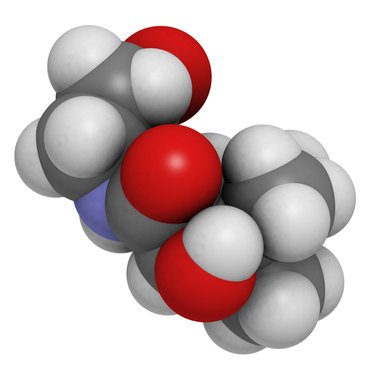
Coenzyme A, a helper molecule, is a nonprotein chemical substance needed for the activation of some enzymes, the proteins that catalyze or activate important chemical reactions within the body. It is naturally synthesized from pantothenic acid or vitamin B5, a vitamin found naturally in food sources such as meat, vegetables, legumes and milk, wrote Jeremy M. Berg and colleagues in "Biochemistry." Coenzyme A and its derivatives can also be successfully produced in chemical laboratories.
Fatty Acid Synthesis
Video of the Day
According to the "Molecular Biochemistry II" handbook, an online publication of the Rensselaer Polytechnic Institute, coenzyme A is the helper molecule that facilitates the oxidation pathway. This process results in the production of acetyl-coenzyme A, an important chemical substance used for the initiation of fatty acid production within the living cell. Without this much-needed process, there is no production of fatty acids, the compounds that maintain the integrity of the cell membrane, the protective covering of each living cell.
Video of the Day
Drug and Enzyme Functioning
Coenzyme A improves the functioning of some proteins, sugars and drugs, wrote Sareen S. Gropper and colleagues in "Advanced Nutrition and Human Metabolism." In drugs, it is used to extend a medication's half-life, the length of time needed to decay or inactivate half of active ingredients of a certain drug, prolonging its ideal effect in the body. In cells, coenzyme A causes activation or inactivation of certain chemical compounds, such as enzymes.
Energy Production
Coenzyme A, in the form of acetyl-coenzyme A, initiates the Krebs cycle, a chemical process within the body that results in the production of carbon dioxide and adenosine triphosphate, according to the Charles E. Ophardt's "Virtual Chembook." published online by Elmhurst College. ATP is an important, energy-rich compound that provides fuel and energy needed for the synthesis of protein and deoxyribonucleic acid, the genetic code needed for cell replication in the body.